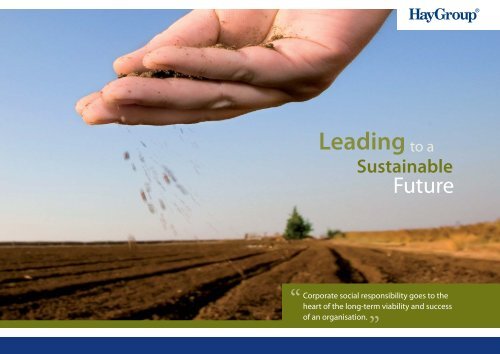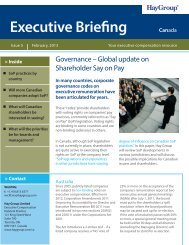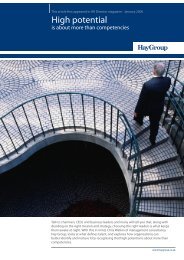Leading to a Sustainable Future - Hay Group
Leading to a Sustainable Future - Hay Group
Leading to a Sustainable Future - Hay Group
Create successful ePaper yourself
Turn your PDF publications into a flip-book with our unique Google optimized e-Paper software.
<strong>Leading</strong><br />
<strong>to</strong> a<br />
<strong>Sustainable</strong><br />
<strong>Future</strong><br />
“<br />
Corporate social responsibility goes <strong>to</strong> the<br />
heart of the long-term viability and success<br />
of an organisation.<br />
”
<strong>Hay</strong> <strong>Group</strong><br />
FOCUS<br />
Corporate Social Responsibility<br />
<strong>Leading</strong> <strong>to</strong> a<br />
<strong>Sustainable</strong> <strong>Future</strong><br />
<strong>Hay</strong> <strong>Group</strong>’s James Bourchier and Helen Scotts bring clarity<br />
<strong>to</strong> the issue of sustainability and focus on the things that<br />
CEOs and senior leaders need <strong>to</strong> do <strong>to</strong> lead a sustainable<br />
and socially responsible corporation – one that meets the<br />
expectations of stakeholders now and in<strong>to</strong> the future.<br />
The terms ‘corporate social<br />
responsibility’ and ‘sustainable<br />
organisation’ have become part of<br />
our corporate language. The trouble<br />
is everyone wants <strong>to</strong> tick these boxes,<br />
without understanding that the issues<br />
they describe are more than short-term<br />
management fads. Do we really know<br />
what it means for how we design and run<br />
organisations? Do CEOs understand why<br />
they should take up this challenge?<br />
For organisations, sustainability means<br />
focusing on managing the impact they<br />
have on the world at large. This means<br />
minimising the harmful impact and<br />
seeking opportunities for positive impact<br />
<strong>to</strong> create now the organisation it wishes <strong>to</strong><br />
be in the future.<br />
The tendency <strong>to</strong> connect ‘sustainability’<br />
only with environmental issues ignores<br />
the fact that sustainability also relates <strong>to</strong><br />
people – employees, cus<strong>to</strong>mers and other<br />
stakeholders. <strong>Sustainable</strong> organisations are<br />
concerned about their employees: building<br />
talent, creating development opportunities<br />
and contributing <strong>to</strong> growth within<br />
the broader community. Promoting<br />
an environment which energises and<br />
develops people makes good business<br />
sense. A sustainable environment ensures<br />
retention, builds a great employer brand<br />
and secures a cus<strong>to</strong>mer base for the future.<br />
Enlightened leaders know that their<br />
employees are their cus<strong>to</strong>mers.<br />
Corporate social responsibility<br />
Corporate social responsibility (CSR)<br />
implies that corporations (businesses<br />
and other organisations) have a<br />
responsibility (both a moral obligation<br />
and commitment) in a social context<br />
<strong>to</strong> take action and build a sustainable<br />
organisation. CSR requires leaders <strong>to</strong> be<br />
visionary about the end state they want <strong>to</strong><br />
create and <strong>to</strong> have the capacity <strong>to</strong> translate<br />
that vision in<strong>to</strong> concrete changes they<br />
will want <strong>to</strong> lead themselves. It demands<br />
the same degree of personal commitment<br />
required <strong>to</strong> lead any significant change<br />
effort and requires leaders <strong>to</strong> ask<br />
themselves some key questions:<br />
• Where do I stand on this issue<br />
personally? How will I then engage<br />
others in the discussion?<br />
• How deep do we want <strong>to</strong> take our<br />
CSR? How can we integrate our<br />
response <strong>to</strong> optimise emergent<br />
strengths and opportunities and<br />
respond <strong>to</strong> emergent weaknesses and<br />
threats effectively and responsibly?<br />
Not just a management fad<br />
CSR must be seen as a strategic issue<br />
because it goes <strong>to</strong> the heart of the<br />
long-term viability and success of an<br />
organisation. It is intrinsically linked <strong>to</strong><br />
the organisation’s future. Market and<br />
consumer expectations have grown for<br />
organisations <strong>to</strong> demonstrate CSR and be<br />
structured <strong>to</strong>wards a sustainable future.<br />
Consumers of the future will make their<br />
choices based on how organisations<br />
perform against this measure and future<br />
generations of employees will want <strong>to</strong> feel<br />
aligned and connected with the values of<br />
their employer. If there is a disconnect<br />
they simply won’t stay. Given the tight<br />
labour market and the measures now<br />
required <strong>to</strong> attract and retain a new<br />
generation of workers, organisations<br />
cannot afford high turnover if they want<br />
<strong>to</strong> remain competitive.<br />
Corporations must see themselves as<br />
operating in a social system comprised<br />
of many parts, players, interests and<br />
competing needs. The notion of ‘social<br />
responsibility’ implies an obligation <strong>to</strong><br />
contribute in a manner that is not self-<br />
serving but rather directed <strong>to</strong>wards some<br />
common good. To pursue a CSR agenda<br />
in a genuine way, an organisation must see<br />
itself as connected – impacting and being<br />
impacted on by other elements of the<br />
social system.<br />
How organisations actually respond will<br />
be a matter of choice. Some will respond<br />
at a minimal level, taking steps <strong>to</strong> manage<br />
environmental impact in order <strong>to</strong> protect<br />
themselves from litigation and ensure<br />
shareholder return. Others will go further<br />
and take a more systemic approach,<br />
seeking <strong>to</strong> understand themselves better<br />
in an expanding, fast moving context and<br />
thinking about future business impacts<br />
– adopting and integrating policy and<br />
process change <strong>to</strong> s<strong>to</strong>re up for the future.<br />
When organisations embark on<br />
sustainability as a strategic issue, they will<br />
take a systemic approach. It will be seen<br />
as integrally linked <strong>to</strong> business strategy.<br />
Consequently, it will be the role of CEOs<br />
and the executive leaders <strong>to</strong> push the CSR<br />
agenda. They will appreciate the fact that<br />
in a strategic context, seeking a sustainable<br />
future will involve consideration of how the<br />
organisation engages with its cus<strong>to</strong>mers,<br />
how it interfaces with the market, how it<br />
operates, how it is structured and how core<br />
processes are managed now.<br />
Organisational responses<br />
Strategies for addressing CSR and<br />
sustainability issues have been varied.<br />
Organisational outcomes and benefits<br />
are moderated by the depth of their<br />
investment, their integration and context<br />
as outlined in table 1.<br />
It is unlikely that most organisations will<br />
reach the deepest level of CSR, which<br />
156<br />
572
<strong>Hay</strong> <strong>Group</strong><br />
FOCUS<br />
Corporate Social Responsibility<br />
Table 1: The CSR Hierarchy<br />
CSR Lite<br />
CSR Compliant<br />
CSR Strategic<br />
CSR Integrated<br />
Deep CSR<br />
Companies with superficial or marginal commitment <strong>to</strong><br />
meaningful social or environmental improvement. They<br />
adopt minimal general standards but are not interested in<br />
advancing beyond this level.<br />
Companies committed <strong>to</strong> ensuring their operations<br />
demonstrate adherence <strong>to</strong> current CSR standards. They<br />
focus on building stakeholder support for their CSR<br />
approach and securing their social license <strong>to</strong> operate.<br />
Companies that adopt basic standards and become<br />
strategic about their approach <strong>to</strong> CSR, using it <strong>to</strong> create<br />
shareholder value through product differentiation, niche<br />
marketing, etc. They create strategies around a few<br />
aspects of CSR for which they can develop competitive<br />
advantage and generate significant impact. Some<br />
believe their survival depends on their CSR or sustainable<br />
development strategies without which they might go out<br />
of business.<br />
Companies that integrate CSR throughout their business<br />
model, not simply as a strategic advantage in niche<br />
markets, but <strong>to</strong> fulfil their commitment <strong>to</strong> reduce their<br />
environmental footprint and improve the social impact of<br />
their operations. They have comprehensive CSR policies<br />
covering all aspects of their operations and operationalise<br />
CSR principles through such things as rigorous<br />
performance standards, corporate objectives and reward<br />
mechanisms.<br />
Companies that adopt or are founded on business models<br />
whose mission is <strong>to</strong> improve social or environmental<br />
conditions. Many will have realised the benefits of CSR<br />
and will have mined and exhausted early-stage CSR<br />
measures. They act <strong>to</strong> address real trade-offs between<br />
elements of the triple bot<strong>to</strong>m line in sustainable<br />
consumption, resource extraction, just transitions, and<br />
intergenerational equity etc.<br />
Table adapted from research by the Canadian Co-operative Association (http://www.coopscanada.coop/)<br />
reflects a very particular business model.<br />
However, there are strategic questions <strong>to</strong><br />
be answered by all organisations regarding<br />
their position on CSR, such as where<br />
are they now and how far do they go?<br />
Becoming better corporate citizens is not a<br />
statement or an endpoint, it is a journey.<br />
The role of leaders<br />
Responses <strong>to</strong> the issue of CSR and<br />
sustainability need <strong>to</strong> be championed by<br />
key leaders in the organisation. A lack of<br />
leadership on these issues has led <strong>to</strong> some<br />
notable corporate ‘disasters’ (for example<br />
James Hardy, HIH). Following these, the<br />
ASX introduced best practice guidelines 1<br />
which helped <strong>to</strong> reassure the market<br />
and suggested the emergence of greater<br />
corporate consciousness. They also put the<br />
CSR mandate squarely with the board of<br />
direc<strong>to</strong>rs and leaders by recognising the<br />
relationship between CSR, sustainability<br />
and governance.<br />
Corporate governance principles and<br />
responsiveness <strong>to</strong> CSR and sustainability<br />
appear <strong>to</strong> be going hand in hand <strong>to</strong>wards<br />
corporate best practice. In 2007 the ASX<br />
went further, requiring listed entities<br />
<strong>to</strong> disclose their compliance with new<br />
corporate governance regulations 2 . A<br />
greater consideration of CSR and the<br />
sustainability of business practices have<br />
clearly been mandated.<br />
The board of any organisation may be<br />
charged with directing a CSR response,<br />
but it takes a committed leader <strong>to</strong> manage<br />
the change and lead the organisation <strong>to</strong> a<br />
clear understanding of the CSR business<br />
context. The complexity inherent in<br />
the CSR challenge and the diversity of<br />
information needed <strong>to</strong> meet the challenge,<br />
requires a leader with the ability <strong>to</strong> see the<br />
‘big picture’ while focusing on the detail.<br />
CSR leaders need <strong>to</strong> be ready <strong>to</strong> step in<strong>to</strong><br />
terri<strong>to</strong>ry outside their corporate comfort<br />
zones, a step which inevitably brings<br />
uncertainty. Collaborative leadership<br />
allows concerns <strong>to</strong> be brought in<strong>to</strong> the<br />
open and managed, which reassures and<br />
helps employees <strong>to</strong> understand the CSR<br />
approach while promoting ownership of<br />
the outcomes. A key challenge in rolling<br />
out a CSR strategy will be <strong>to</strong> ensure<br />
it aligns with the organisation’s wider<br />
strategy and <strong>to</strong> manage any mismatch.<br />
The CEO’s responsibility<br />
Turning CSR concepts in<strong>to</strong> actions and<br />
making them work requires a leader who<br />
can create a culture of awareness and<br />
engagement while ensuring integration<br />
and compliance. CEOs are the logical<br />
choice for the role, but they must be<br />
supported by the executive team <strong>to</strong><br />
optimise an integrated response <strong>to</strong> the<br />
risks and opportunities represented by an<br />
expanding corporate environment.<br />
The leadership team needs <strong>to</strong> start with a<br />
clear understanding of an organisation’s<br />
economic, social and environmental<br />
responsibilities, and the impact they are<br />
having and can potentially have in the<br />
future. With this knowledge the leader<br />
can begin moulding the organisation’s<br />
future impact, identifying the easy gains<br />
from a CSR approach and positioning<br />
the organisation <strong>to</strong> consider future<br />
implications and direction. The leadership<br />
team’s understanding and confidence<br />
in the relevance of CSR, will inform its<br />
CSR strategy and frame the organisation’s<br />
relationships and interactions as well<br />
as its response. Tactical investments in<br />
resources must support the strategy and<br />
358<br />
594
<strong>Hay</strong> <strong>Group</strong><br />
FOCUS<br />
Corporate Social Responsibility<br />
operational adjustments made <strong>to</strong> integrate<br />
the initiative successfully.<br />
At the shallow end, leading an<br />
organisation down the ‘CSR Lite’ path<br />
is likely <strong>to</strong> be fairly straightforward.<br />
Simple initiatives may be implemented,<br />
ensuring policies are in place that reduce<br />
power and water consumption or that<br />
no stakeholder backlash is looming from<br />
existing operations or strategies. However,<br />
the benefits and outcomes of such an<br />
approach are also limited.<br />
<strong>Leading</strong> a strategic and systemic approach<br />
<strong>to</strong> CSR is more difficult. It requires that<br />
organisational boundaries be redefined<br />
or eliminated and engagement with a<br />
much broader range of stakeholders<br />
than an organisation might typically<br />
consider. A systemic CSR response is<br />
likely <strong>to</strong> need a cross functional and<br />
multidisciplinary approach <strong>to</strong> gather and<br />
act upon sustainability information and<br />
Position<br />
Strategy<br />
Operation<br />
social input. It will also call for investment<br />
in new information systems along<br />
with more sophisticated approaches <strong>to</strong><br />
business analysis. Stakeholder engagement<br />
programs, environmental impact studies,<br />
product lifecycle analysis, business model<br />
sustainability, employee engagement and<br />
research and development are but a few<br />
potential aspects of a comprehensive,<br />
strategic CSR response. <strong>Leading</strong> a<br />
systemic CSR response can be challenging,<br />
however, as an investment in the future,<br />
the benefits and outcomes are also greater.<br />
A viable future<br />
Summary of the <strong>to</strong>p five issues for leaders <strong>to</strong> consider<br />
Tactics<br />
Alignment<br />
Enlightened CSR leaders who are<br />
aware of the increasingly complex and<br />
dynamic globalised context (socially,<br />
environmentally and economically) are<br />
better placed <strong>to</strong> understand the emerging<br />
requirements of their organisations.<br />
Leaders with this insight can expect <strong>to</strong><br />
identify emergent strengths, weaknesses,<br />
Where do I stand on this issue personally? How will I then<br />
engage others in the discussion?<br />
How deep do we want <strong>to</strong> take our CSR?<br />
How do I need <strong>to</strong> change the way I work with my board and<br />
<strong>to</strong>p team <strong>to</strong> ensure that CSR and sustainability issues and<br />
systems are unders<strong>to</strong>od and managed?<br />
What programs, processes and information systems need<br />
<strong>to</strong> change <strong>to</strong> implement the strategy? (Triple bot<strong>to</strong>m<br />
line accounting, action research, sustainability analysis,<br />
stakeholder engagement systems etc.)<br />
How do we align our response with our current and future<br />
strategies, utilising our new understanding of a wider, longterm<br />
business context <strong>to</strong> influence strategic decision making?<br />
opportunities and threats for their<br />
organisations that would otherwise not<br />
be managed optimally. They will be better<br />
able <strong>to</strong> lead, coordinate and understand<br />
all these elements thereby increasing<br />
their ability <strong>to</strong> respond in a more<br />
integrated way. This will create a more<br />
comprehensive view for decision-making<br />
<strong>to</strong> ensure a systemic approach.<br />
Behaving as a socially responsible<br />
corporation means establishing a viable<br />
future from a commercial point of view<br />
while doing some good in the present.<br />
Leaders who step up <strong>to</strong> the CSR challenge<br />
by minimising negative impacts on the<br />
environment and by seeking <strong>to</strong> make a<br />
positive impact via community and social<br />
initiatives, help drive their organisations<br />
<strong>to</strong> a successful and sustainable future. •<br />
1<br />
Principles of Good Corporate Governance and Best<br />
Practice Recommendations (2003).<br />
2<br />
Corporate Governance Principles and<br />
Recommendations (2007).<br />
CSR and sustainability as an investment<br />
CSR is not typically on the balance sheet of many organisations. <strong>Hay</strong> <strong>Group</strong> believes<br />
market pressure is creating a need for CSR programs that account for the risks and<br />
opportunities associated with these less tangible resources more actively. The value<br />
of any investment lies in the value of the underlying resources, opportunities and risks<br />
it represents. In the same way, the value of a CSR investment is related <strong>to</strong> the social,<br />
environmental and economic resources it both accesses and impacts.<br />
Currently, organisations that are scrupulously tracking their financial activity may not be<br />
consistently moni<strong>to</strong>ring the opportunities and risks associated with social engagement<br />
and the environment. In a simple example of how a CSR program could start <strong>to</strong> do this,<br />
organisations that engage in employee climate surveys have access <strong>to</strong> rich information<br />
about the opportunities and risks associated with their employee group – a shift in<br />
sentiment may quickly increase employee turnover and, therefore, have direct financial<br />
impact. A more complex risk that many organisations may soon have <strong>to</strong> face is a<br />
carbon tax. Most local organisations produce carbon emissions (that is, are not carbon<br />
neutral) whether through production, waste or travel. Only a minority of organisations<br />
are moni<strong>to</strong>ring this ‘externalised liability’ – but moni<strong>to</strong>ring carbon emissions may soon<br />
become a requirement and a carbon tax will become an accounting cost. CSR programs<br />
should be seen as investments with emergent dividends. Long-term yield will become<br />
more obvious as successful strategies identify leaders in a market that is hotting-up<br />
around CSR, even as growth slows.<br />
Leaders who begin <strong>to</strong> account for CSR related risks and opportunities through business<br />
linked CSR programs, as they would more tangible assets, will be ready <strong>to</strong> face market<br />
changes and position their organisations with a competitive advantage for a more<br />
sustainable future.<br />
560<br />
616

















